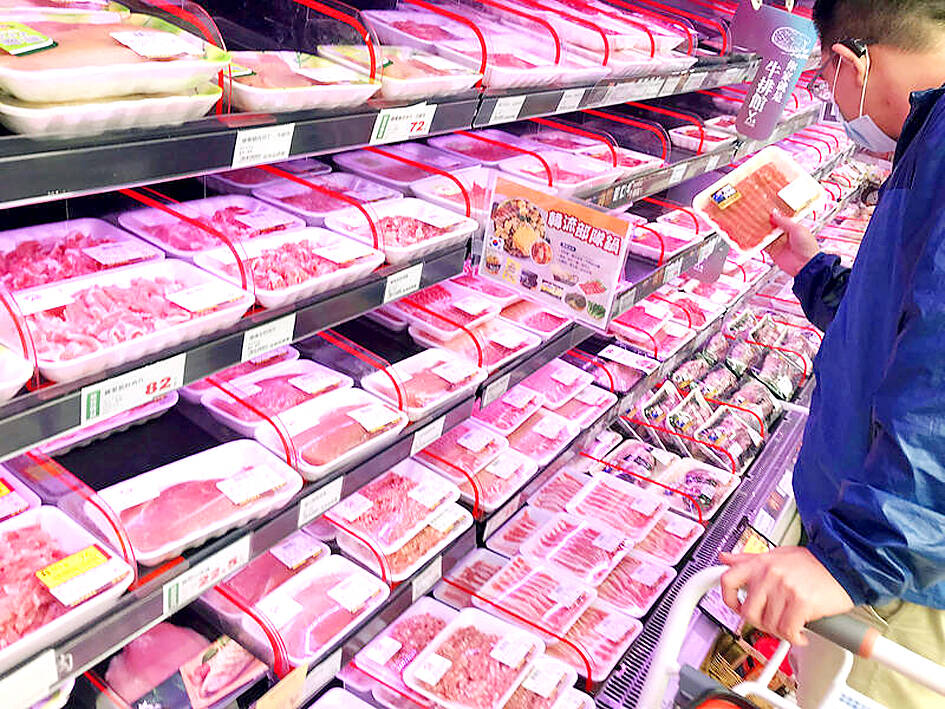Taiwan is planning to allow the import of Japanese beef products of all ages but has yet to set a timeline, said Food and Drug Administration (FDA) Director-General Chiang Chih-kang (姜至剛) yesterday.
The FDA first proposed the plan on March 4, setting up a 60-day window to gather public opinion that ended yesterday, but Chiang said more discussion was still needed before a firm timeline of when to lift existing restrictions on Japanese beef imports could be set.
Currently, Taiwan only allows imports of beef products from Japan from cattle no more than 30 months old.

Photo: CNA
The strict regulations were imposed in 2003 at the peak of the international outbreak of bovine spongiform encephalopathy (BSE), commonly known as mad cow disease.
By 2017, import regulations were loosened up for beef imports from the United States, Canada and Japan, with permission eventually being given to import beef of all ages from the United States and Canada in 2021 and 2023, respectively.
Japan will likely soon be added to that list.
According to Chiang, Japan has not experienced a case of mad cow disease in over 15 years, and its beef has also been categorized by the World Organization for Animal Health (WOAH) to be as safe as that of the US and Canada.
Over 30 countries, including the US, Canada, Australia, New Zealand and the European Union have already allowed the import of Japanese beef products of all ages into their territories, and Taiwan’s opening will merely follow international standards, Chiang said.
The most conservative estimate of higher-risk boned beef products indicate that only one in 150 million consumers may be at risk of exposure to Creutzfeldt-Jakob disease (CJD), which is linked to mad cow disease, he said.
On the actual timeline of the drafting of and completion of related regulations, Chiang said discussions will have to be held between experts and representatives of various fields for a gradual rollout to ensure safety.

The Coast Guard Administration (CGA) yesterday said it had deployed patrol vessels to expel a China Coast Guard ship and a Chinese fishing boat near Pratas Island (Dongsha Island, 東沙群島) in the South China Sea. The China Coast Guard vessel was 28 nautical miles (52km) northeast of Pratas at 6:15am on Thursday, approaching the island’s restricted waters, which extend 24 nautical miles from its shoreline, the CGA’s Dongsha-Nansha Branch said in a statement. The Tainan, a 2,000-tonne cutter, was deployed by the CGA to shadow the Chinese ship, which left the area at 2:39pm on Friday, the statement said. At 6:31pm on Friday,

The Chinese People’s Liberation Army Navy’s (PLAN) third aircraft carrier, the Fujian, would pose a steep challenge to Taiwan’s ability to defend itself against a full-scale invasion, a defense expert said yesterday. Institute of National Defense and Security Research analyst Chieh Chung (揭仲) made the comment hours after the PLAN confirmed the carrier recently passed through the Taiwan Strait to conduct “scientific research tests and training missions” in the South China Sea. China has two carriers in operation — the Liaoning and the Shandong — with the Fujian undergoing sea trials. Although the PLAN needs time to train the Fujian’s air wing and

The American Institute in Taiwan (AIT) put Taiwan in danger, Ma Ying-jeou Foundation director Hsiao Hsu-tsen (蕭旭岑) said yesterday, hours after the de facto US embassy said that Beijing had misinterpreted World War II-era documents to isolate Taiwan. The AIT’s comments harmed the Republic of China’s (ROC) national interests and contradicted a part of the “six assurances” stipulating that the US would not change its official position on Taiwan’s sovereignty, Hsiao said. The “six assurances,” which were given by then-US president Ronald Reagan to Taiwan in 1982, say that Washington would not set a date for ending arm sales to Taiwan, consult

A Taiwanese academic yesterday said that Chinese Ambassador to Denmark Wang Xuefeng (王雪峰) disrespected Denmark and Japan when he earlier this year allegedly asked Japan’s embassy to make Taiwan’s representatives leave an event in Copenhagen. The Danish-language Berlingske on Sunday reported the incident in an article with the headline “The emperor’s birthday ended in drama in Copenhagen: More conflict may be on the way between Denmark and China.” It said that on Feb. 26, the Japanese embassy in Denmark held an event for Japanese Emperor Naruhito’s birthday, with about 200 guests in attendance, including representatives from Taiwan. After addressing the Japanese hosts, Wang